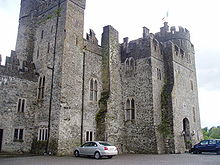Thomas de Rokeby (died 1356)
[2] He was appointed to that office to restore law and order to Ireland, and had considerable early success in this task, but he was recalled to England after the military situation deteriorated.
[2] Rokeby first came to public attention in 1327 when, after his return from prison in Scotland, he received the thanks of the new King Edward III for being the squire who had first pointed out the approach of the Scots army during the invasion of the previous July.
[2] While there was some surprise at the appointment of an old soldier to such a sensitive political position, the more informed view was that Rokeby would be well suited to the task of enforcing justice by military force.
He arrived in December and made a quick circuit of the south of Ireland, mainly to keep watch on the powerful and troublesome magnate Maurice FitzGerald, 1st Earl of Desmond.
[3] Arguably he showed excessive zeal in arresting and imprisoning the Treasurer of Ireland, Robert de Emeldon, a man who enjoyed the King's personal regard.
Rokeby showed considerable skill in crushing the uprising and succeeded in replacing the rebellious head of the clan, Dermot MacCarthy, with his more compliant cousin Cormac.
[2] Rokeby was a popular and respected figure in Ireland: he was described as "a just and prudent man, who paid well for his victuals, and did not rob the poor" (i.e. he did not abuse the much-criticized system of purveyance, the forcible requisition of foodstuffs from the public).
Otway-Ruthven contrasts his early successes with his disappointing later record, and notes that the 1350s was the crucial decade in which the English Crown lost control of much of Ireland until the sixteenth century.
